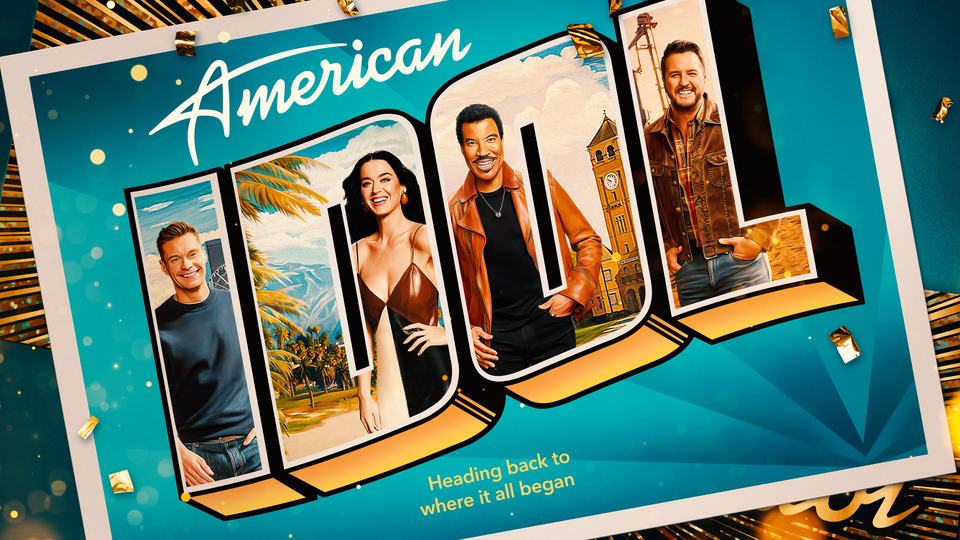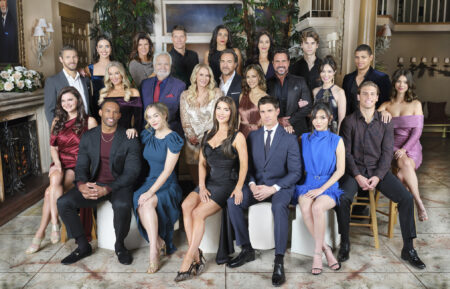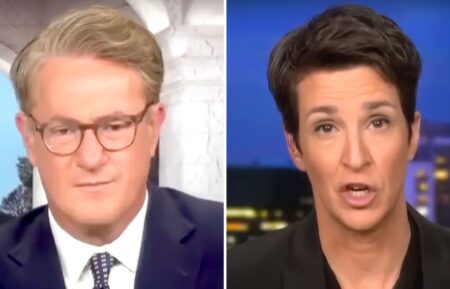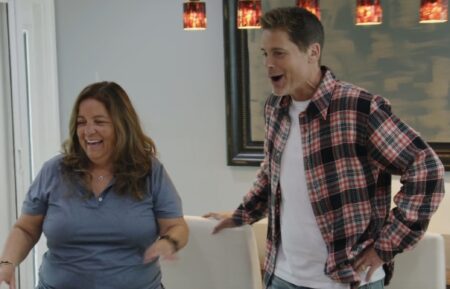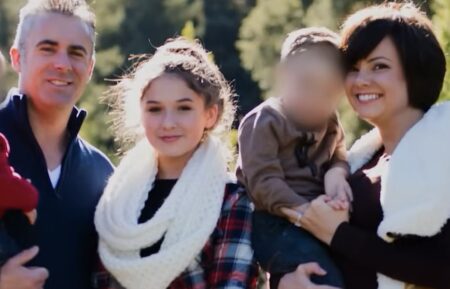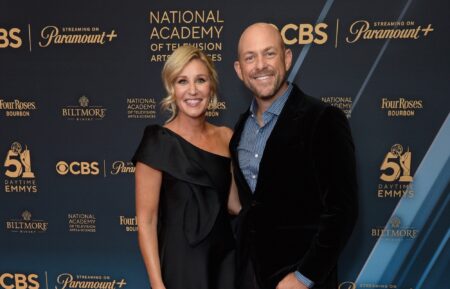Looking Back on ‘American Idol’: Judges and Winners Reveal Secrets and Behind-the-Scenes Drama
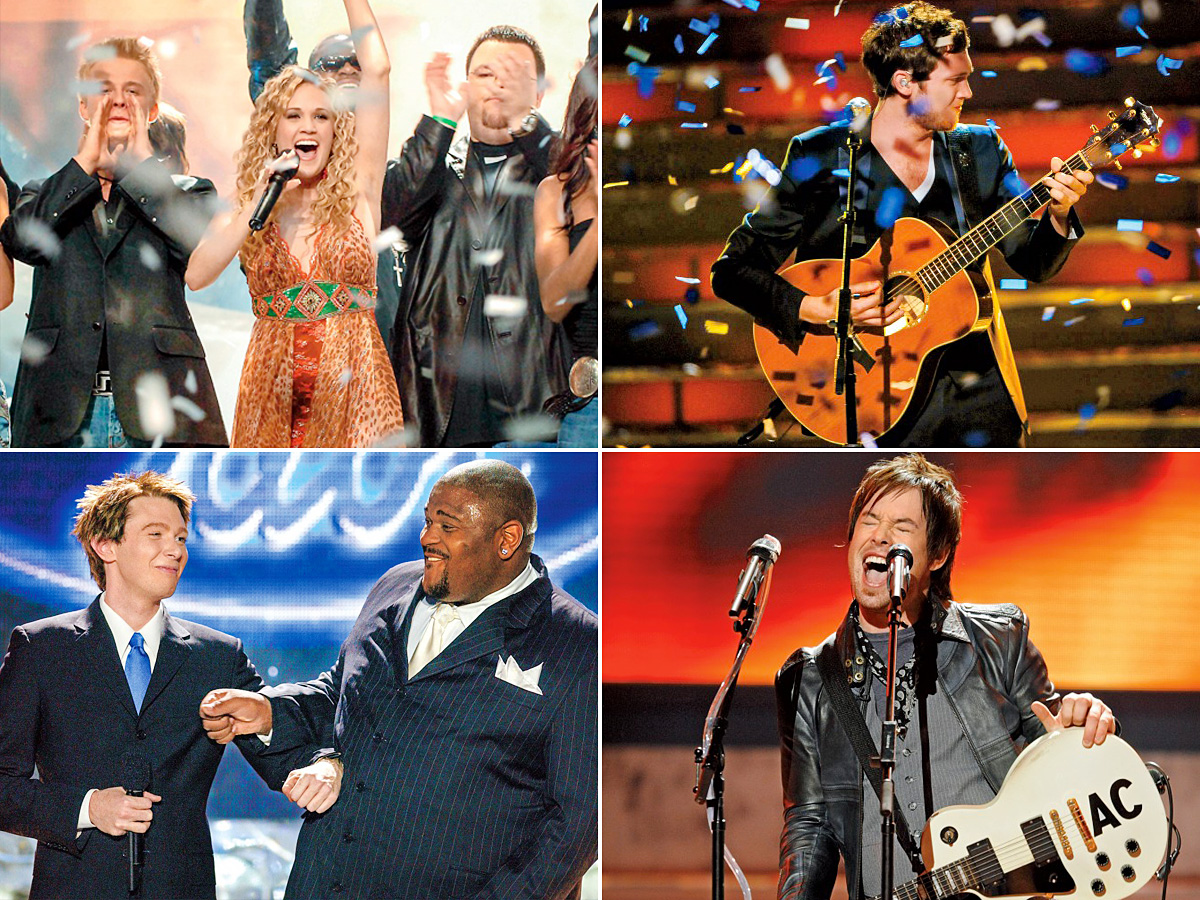
During the summer of 2002, America was captivated by a 20-year-old singer from Joshua, Texas, named Kelly Clarkson who transformed from a struggling cocktail waitress into a bona fide superstar. Over the next decade, American Idol took the worlds of television and music by storm, dominating ratings while also creating legitimate hitmakers, including Carrie Underwood, Jennifer Hudson and Adam Lambert. On April 7, viewers—along with current judges Jennifer Lopez, Keith Urban and Harry Connick Jr.—will crown the show’s 15th and final winner. Before Idol hits the stage for its swan song, notable figures from the show’s past and present share their stories about the rise of TV’s biggest singing competition.
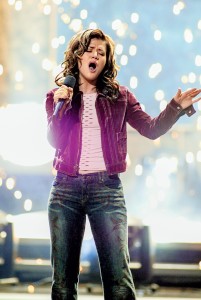
Kelly Clarkson
Simon Fuller (creator and executive producer): My perspective is to take things and have them go global. But the initial inroads to bring the show to America were miserable. We had a bunch of meetings with various networks, but all the executives heard was “talent show.” It was so bad, I didn’t even bother showing up to a couple of meetings. But then we launched Pop Idol in the U.K. and it immediately did extremely well.
Mike Darnell (former president of alternative entertainment, Fox Broadcasting): 9/11 had hit and everybody was in a tizzy as far as reality [programming]. There was this whole controversy about what the country wanted, and there was a sense that maybe we should be doing some aspirational things. I was a child actor, and the auditioning process was always very intriguing to me because I knew how tough, grueling and entertaining that could be. The show had just aired in England and it was a smash, so that made it a much bigger priority for us to put real money against it.
Fuller: The idea behind the judging panel was not necessarily to have stars but people who have knowledge of the music industry. I knew if we got Simon Cowell [who was a judge on Pop Idol], we were going to be fine.
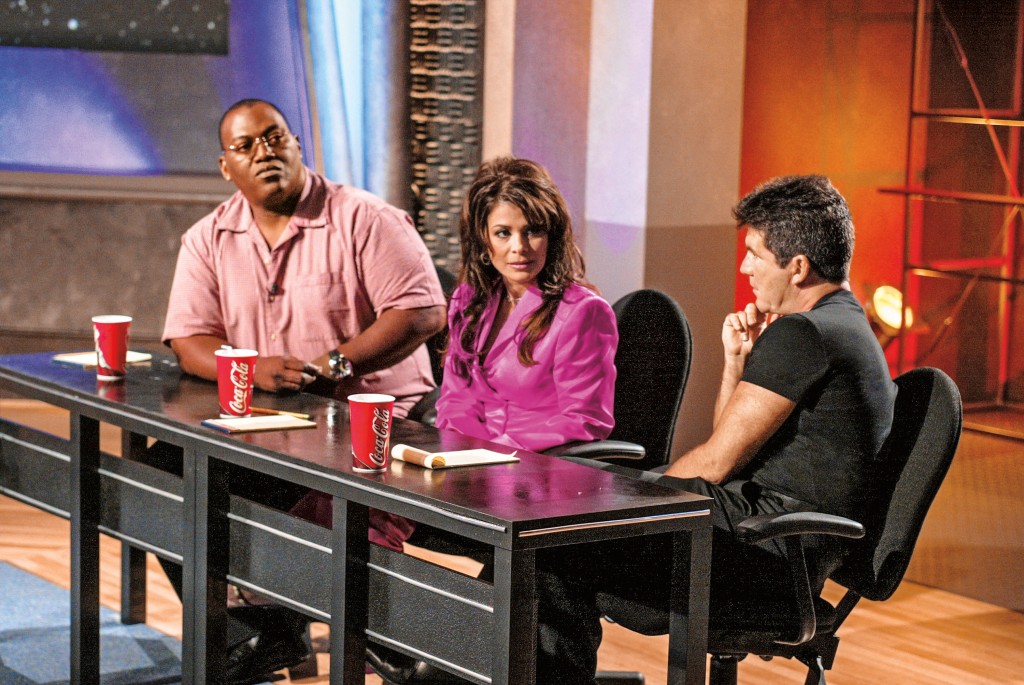
Randy Jackson, Paula Abdul and Simon Cowell
Simon Cowell (judge, Seasons 1–9): At the last minute, I thought to myself, “I’m not sure I want to put myself through this.” But the producers promised me it was going to be just like [the show] in England. I could be exactly myself, no one was going to censor me and I could just have fun.
Fuller: Simon is direct, abrasive and just tells it how it is. So we needed the companions of the knowledgeable record producer and the sympathetic, supportive female.
Paula Abdul (judge, Seasons 1–8): Three years prior to American Idol, I saw this clairvoyant woman who predicted I would be doing a show that started across the pond and described exactly who I would be sitting in between. That’s how whimsical my life is.
Randy Jackson (judge, Seasons 1–12): The very first show that we did together was kind of a shock. Simon was mean to the first two contestants, and Paula and I looked at each other like, “What the hell is this?” Let’s just say those first audition cities were a very intrusive “getting to know you” kind of thing.
VIDEO: Judges Reflect on American Idol‘s 15 Seasons
Abdul: On my first day, I quit a couple of times. Eight, to be exact.
Cowell: It was more than eight times. She went nuts! But by the time we hit the second and third city, she realized that she could actually argue with me, and she started to enjoy it. But we fell out so badly so many times mainly because she didn’t like me disagreeing with her or she didn’t like the way I said something. But it was 100 percent real.
Abdul: I don’t have any brothers, so I learned very quickly what that feels like. There were times where we wouldn’t even talk to each other. We fought like cats and dogs, but at the end of the day, we’d laugh. You can’t stay mad.
Ryan Seacrest (host): I’d never seen a show like that, especially with Simon’s acerbic demeanor, high-waisted pants and tight mock turtleneck. Fox was first interested in me being a judge on the show, but I asked the producers about hosting, so I was pursuing that in tandem with [Season 1 cohost Brian Dunkleman]. They had two hosts in England, and the mandate was a carbon copy of what they were doing overseas, because that was working.
Cowell: It was so obvious that Ryan was going to do everything he could to get Brian off the show. I used to literally be in hysterics of laughter because they were so ill-matched. Brian was actually a very sweet guy, but it was like trying to put a mouse with a snake. The snake’s going to end up eating the mouse.
Jackson: We were in Dallas when we discovered Kelly Clarkson, and that was the moment that I thought to myself that this thing really might work.
Cowell: Kelly’s first audition was actually more fun than it was about her singing. It was during the live shows where we really recognized how good she was. She sang an Aretha Franklin song and I remember looking over at Paula and Randy going, “My God.” None of us were expecting that.
Fuller: That first season was just a dream on every level. We were expecting to find someone great, but Kelly was and still remains a perfect Idol. It just all came together, and there was no looking back.
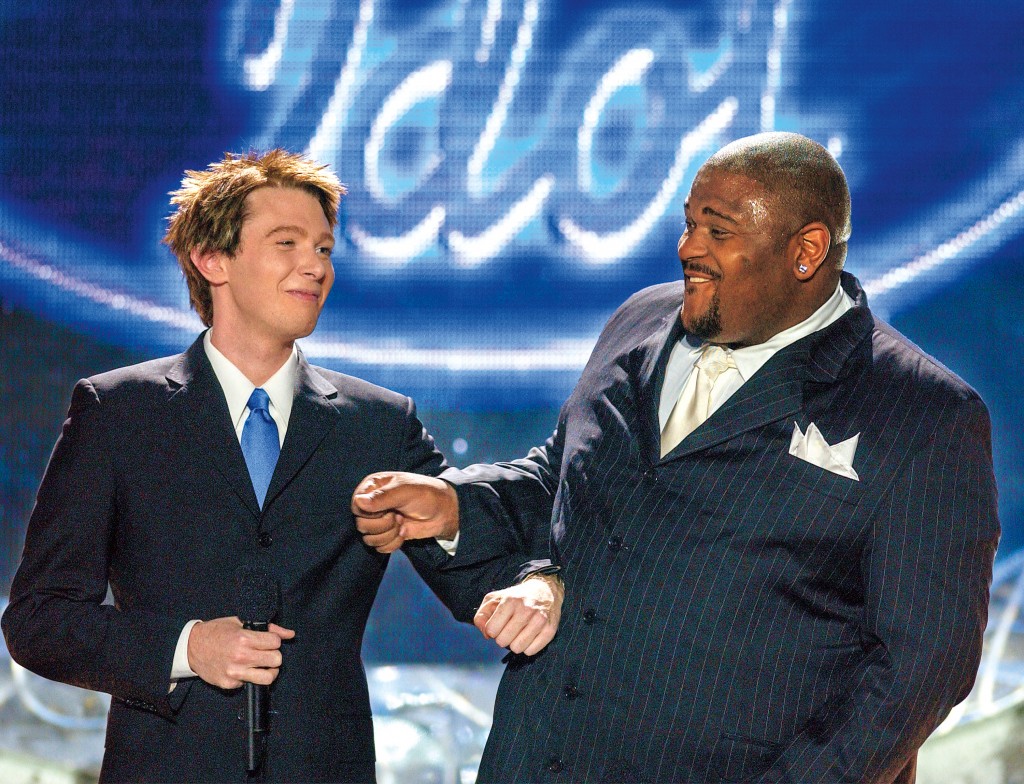
Aiken and Studdard
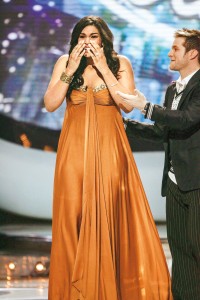
Jordin Sparks
American Idol was an immediate hit, averaging more than 12 million viewers. In Season 2, the series established itself as a reality juggernaut. The May 21, 2003, finale resulted in Idol’s highest ratings of all time, with more than 38 million viewers tuning in to see the showdown between Ruben Studdard and Clay Aiken.
Cowell: For me, the early years were when all the great things happened. [Cartoonishly off-key contestant] William Hung was one of the funniest things. I remember Clay Aiken’s first audition, and his unbelievable transformation throughout the show. One of the best ever finals was Ruben and Clay. They both wanted to win and both gave it everything.
Ruben Studdard (Season 2 winner): There wasn’t any real rivalry. Clay was small and I was big. Clay was white and I was black. It was fun for us. Once we left the show, Clay and I were together in New York and went to Macy’s. It was pandemonium, complete and utter craziness. That is when we decided we could never go shopping with each other again.
Seacrest: Sometimes I would know the results [ahead of time] because I was so anxious, but sometimes I would want to be surprised when we were on the air. Over the years, I tried not to create a tell. Positioning of my body on the stage is very important. I learned that the contestants could see over my shoulder from the Ruben and Clay finale because those guys were tall and they could look down at the card before I read the results.
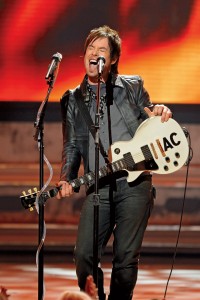
David Cook
Jordin Sparks (Season 6 winner): I remember holding hands with [runner-up] Blake Lewis and standing with Ryan—clearly taller than both of them—being like, “Ryan, can you just move the card a little bit?”Winning was a weird Twilight Zone moment. I saw people clapping, pyrotechnics going off and my family sitting there, but I didn’t hear anything but my heart pounding.
Seacrest: The finales that were fun were when you had two different kinds of artists going head-to-head in a bout, like Kris Allen and Adam Lambert or the two Davids [Cook and Archuleta]. It’s like a boxing match, but with two really different kinds of athletes.
David Cook (Season 7 winner): I was pissed they made us wear those damn boxing robes!
Kris Allen (Season 8 winner): People probably thought that Adam and I were so different that we didn’t get along musically or personality-wise, but we were roommates throughout the whole show. Every night, we’d lie there in our beds and talk about the day. It’s funny how people would pit us against each other.
As Idol’s star grew, so did the popularity of its judges. In Season 8, the panel saw its first shake-up with the addition of lyricist Kara DioGuardi. Season 9 was the first without Abdul, and comedian Ellen DeGeneres was brought in to fill her seat during the live shows. But when Cowell announced that Season 9 would be his last, Fox and the producers were forced to make a major overhaul to the dais, a trend that would continue.
Fuller: Idol became this multibillion-dollar franchise and a powerhouse unlike anything, so suddenly a lot of voices had an opinion. And when Simon finally left, with Paula leaving prior, that was a huge turning point.
Cowell: I knew I’d experienced as good as it was ever going to get. It just stopped being fun to me. It was time to leave the fair, but with great memories.
Darnell: I have a piano in my office, and Steven Tyler [came in for a meeting] and played “Dream On” on it. He was insanely unique, but he wasn’t snobby about music. He just wanted to entertain me. I didn’t know what role he would fill, but we got a judge.
Fuller: Everyone was saying you have to hire another English guy, but no one could ever compare to Simon, no matter how good they were. It had to be a female. The idea of Jennifer Lopez ticked so many boxes:a big star, a huge fan of Idol, and she was glamorous.
Jennifer Lopez (judge, Seasons 10–11, 13–15): When they asked me to be a judge, it didn’t seem like the best career choice for me at the moment. But I loved the show so much, and it wound up reinvigorating, reinventing and reintroducing me, because I hadn’t been in the public eye for a few years. It made people see me for who I really was. When you get to a certain level of fame, there are so many myths and misconceptions about you. But when people got to actually see me laugh and cry, it made me realize that people really liked and appreciated me. It was a confidence booster.
Fuller: Dealing with the Simon departure by replacing him twice over and maintaining Randy made a perfect panel. But going into the second season with Jennifer, Steven and Randy, the show was beginning to age a little bit. With The Voice doing well, the network precedent was to make it youthful and hire stars.
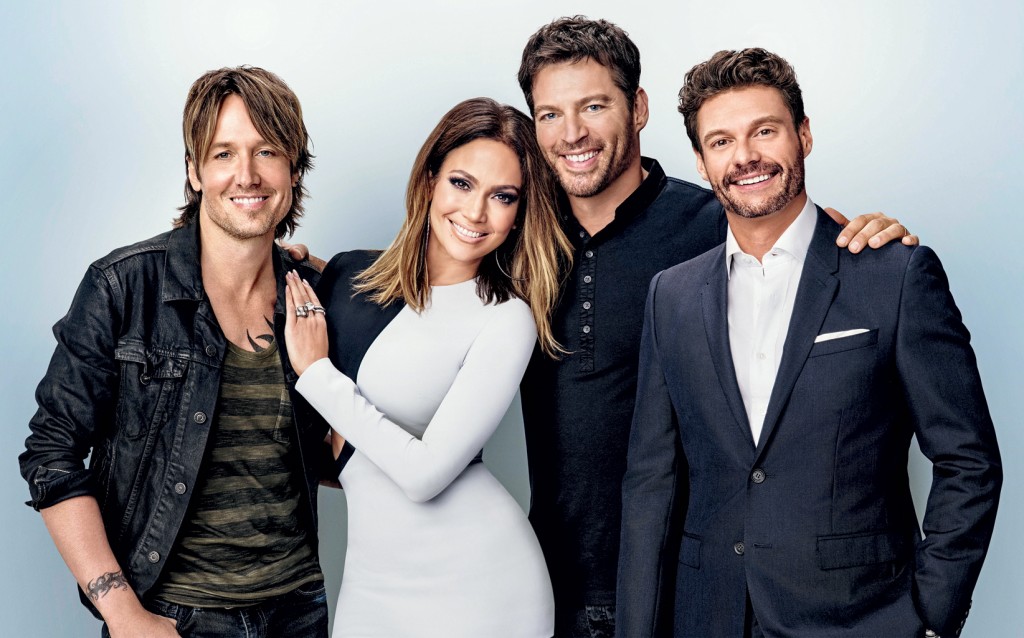
Keith Urban, Jennifer Lopez, Harry Connick Jr., Ryan Seacrest
In Season 12, Lopez and Tyler opted to leave, and the panel was revamped, with country artist Keith Urban, pop star Nicki Minaj and legendary singer Mariah Carey joining Jackson. However, tensions between the two divas boiled over during the auditions and escalated as the season continued.
Darnell: Nicki was as hot as hot could be and Mariah was, of course, an icon. But they did not like each other. It was as simple as that. And there was no manipulating that.
Jackson: That was a bad casting year. You had two people that probably shouldn’t have been judging on the same show. It was just unfortunate.
Fuller: The simple fact is [Season 12] didn’t work. It was drama-filled. So we brought Jennifer back because we knew she worked. I love Harry Connick Jr. [who had previously served as a mentor] and Keith Urban. They brought a new warmth and considerate dimension to the show. They enhance the talent.
Seacrest: There’s a tremendous amount of respect between them. Keith is one of the greatest musicians in the world, Harry is such an Einstein of music, and Jen is a ubiquitous multitasker.
Harry Connick Jr. (judge, Seasons 13–15): There is so much compartmentalization in music today, but American Idol is as big as McDonald’s or Coca-Cola. I remember Kelly’s audition. Fantasia singing “Summertime.” Adam singing the Tears for Fears tune “Mad World.” It’s an institution.
Keith Urban (judge, Seasons 12–15): Idol would take somebody from some no-name town in the middle of Arkansas and suddenly they’re on television every week. It cemented itself as a good family show you could watch with your kids, grandparents, everybody.
Nick Fradiani (Season 14 winner): I’m only seven months out from winning, and I just finished up my album. There is no way you can get to this point this quickly without the show.
Seacrest: It truly delivered on the promise of searching for unknowns and creating superstars who made hit records, won an Oscar, won Grammys and won American Music Awards. It truly did stand the test of time in terms of following through on the promise of what the show is. I have to make it through the last episode without tears.
American Idol, Series finale, Wednesday and Thursday, April 6 and 7, 8/7c, Fox

